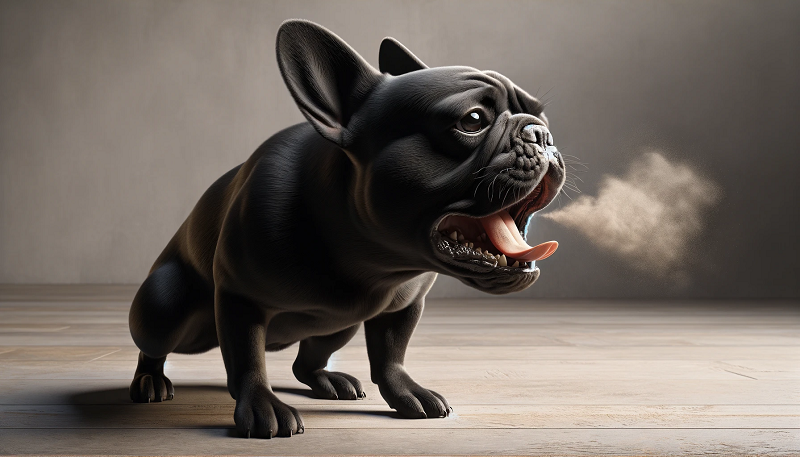Coughing in French Bulldogs
French Bulldogs’ unique traits, such as short snouts and compact airways, make them prone to respiratory issues. Coughing, a common symptom, signals various potential problems.

Written By
Dan Harrison
Editor

Co-Written By
David Anderson
Writer

Reviewed By
Penny Worthington
Health

Research By
Sammi Slater
Researcher
Page Last Updated: 25th March 2024
On this page
Quickly find and read what interests you the most using the links below:
Table of contents:
- Why Do French Bulldogs Cough?
- Common Causes of Coughing in French Bulldogs
- Brachycephalic Obstructive Airway Syndrome (BOAS)
- Kennel Cough (Infectious Tracheobronchitis)
- Heart Disease
- Lung Problems
- Diagnosing the Cause of Coughing
- Treatment Options
- Supportive Care and Home Remedies
- When to See a Vet
- Preventing Coughing in French Bulldogs
- Final thoughts
- Frequently Asked Questions
Why Do French Bulldogs Cough?
The brachycephalic anatomy of French Bulldogs, characterised by their short nasal passages and elongated soft palates, inherently contributes to respiratory challenges.
This anatomical structure can complicate breathing, making coughing a prevalent issue.
Common reasons for coughing in dogs, particularly French Bulldogs, include infections, allergies, heart disease, and more, each affecting them in distinct ways due to their unique physiology.
Common Causes of Coughing in French Bulldogs
Brachycephalic Obstructive Airway Syndrome (BOAS)
BOAS is a singular issue and a constellation of airway abnormalities inherent to brachycephalic breeds like French Bulldogs.
These abnormalities include narrowed nostrils (stenotic nares), elongated soft palate, and everted laryngeal saccules, contributing to significant respiratory distress.
The anatomical constraints lead to increased breathing effort, manifesting as loud sounds, snoring, and frequent coughing.
The condition’s severity can vary, and in severe cases, it significantly impacts the dog’s quality of life, leading to exercise intolerance, heat sensitivity, and even life-threatening respiratory crises.
To improve airflow, surgical intervention aims to correct anatomical abnormalities, such as widening the nostrils or shortening the elongated soft palate.
However, surgery has risks and requires careful consideration and post-operative care.
Kennel Cough (Infectious Tracheobronchitis)
Kennel cough is characterised by an acute, highly contagious cough caused by a complex of viral and bacterial pathogens.
The primary symptom is a persistent, forceful cough that many describe as sounding like a “goose honk.”
In French Bulldogs, whose respiratory systems are already compromised, kennel cough can be particularly distressing and may exacerbate breathing difficulties.
Treatment often includes rest, isolation to prevent infection spread, and supportive care.
Antibiotics may be prescribed if a bacterial infection is suspected, and cough suppressants may be used to provide relief.
Vaccination against some causative agents of kennel cough is available and recommended, especially for dogs that frequent boarding facilities, dog parks, or other environments where they interact with many dogs.
Heart Disease
Heart disease in French Bulldogs can manifest in several forms, with some conditions being congenital (present at birth) and others developing with age.
Symptoms of heart disease, including coughing, may result from the heart’s decreased ability to pump blood effectively, leading to fluid buildup in the lungs (pulmonary oedema) or enlargement of the heart that physically presses on the airway.
Diagnosis of heart disease relies on a thorough veterinary examination, including auscultation (listening to the heart and lungs), imaging studies such as chest X-rays or echocardiography, and possibly blood tests to assess heart function.
Treatment varies depending on the specific type of heart disease but may include medications to improve heart function, reduce fluid accumulation, and manage secondary symptoms.
Lung Problems
Lung problems, including pneumonia and lung tumours, pose significant health risks.
Pneumonia, an infection of the lungs, can lead to coughing, difficulty breathing, lethargy, and fever.
Treatment typically involves antibiotics and supportive care.
Lung tumours, which may be benign or malignant, require a comprehensive diagnostic approach, including imaging and biopsy, to determine the appropriate treatment plan.
Surgical removal, chemotherapy, or radiation therapy may be options based on the tumour’s nature and location.
Diagnosing the Cause of Coughing
Diagnosing the cause of coughing in French Bulldogs, given their predisposition to various respiratory issues, is a detailed process that requires a multifaceted approach.
An accurate diagnosis is essential for determining the most effective treatment plan and addressing the root cause of the cough.
Here’s a look at the diagnostic process:
Veterinary Examination
The first step in diagnosing the cause of coughing is a thorough veterinary examination.
This examination includes:
- Clinical History: Understanding the onset, duration, and character of the cough, as well as any additional symptoms (e.g., difficulty breathing, lethargy, changes in appetite or behaviour) the dog is exhibiting.
- Physical Examination: A comprehensive physical exam, paying close attention to the respiratory system. This includes listening to the lungs and heart with a stethoscope, examining the throat area, and checking for any signs of respiratory distress or cyanosis (a bluish tint to the skin and mucous membranes due to lack of oxygen).
Imaging Tests
Imaging plays a crucial role in visualising the structures of the respiratory system and identifying potential causes of coughing:
- X-rays (Radiographs): Chest X-rays are fundamental in evaluating the lungs, heart, and airways. They can reveal signs of bronchitis, pneumonia, heart enlargement, and other conditions like lung tumours.
- Ultrasound: While not as commonly used to diagnose coughing causes, ultrasound can provide detailed images of the heart and help diagnose heart disease, which can be a secondary cause of coughing.
- Computed Tomography (CT) Scan: For more complex cases, a CT scan can offer detailed cross-sectional images of the dog’s chest, providing valuable information when conventional X-rays are inconclusive.
Blood Tests
Blood tests can provide insights into the overall health of the dog and may indicate the presence of underlying conditions that could lead to coughing:
- Complete Blood Count (CBC) and Biochemistry Profile: These tests assess the dog’s general health and can reveal signs of infection, inflammation, or other systemic issues.
- Heartworm Tests: Because heartworm disease can cause coughing, a heartworm test is often part of the diagnostic process for dogs with persistent coughs.
Specific Diagnostics
Depending on the suspected cause of the cough, additional diagnostic tests may be necessary:
- Tracheal Wash or Bronchoalveolar Lavage: These procedures involve collecting fluid samples from the airways, which can then be analysed for the presence of bacteria, fungi, or parasites.
- Endoscopy: This procedure allows for direct visualisation of the airways and can help identify foreign bodies, tumours, or structural abnormalities within the trachea and bronchi.
- Allergy Testing: If allergies are suspected to cause coughing, allergy testing may help identify specific environmental allergens affecting the dog.
Treatment Options
Following a comprehensive diagnostic process, the treatment for coughing in French Bulldogs is determined by identifying the underlying cause.
Effective management is tailored to address the specific conditions diagnosed, ranging from medical interventions to surgical procedures and supportive care.
Let’s explore the treatment options in detail that are relevant to the causes outlined previously.
Brachycephalic Obstructive Airway Syndrome (BOAS)
For BOAS, surgical intervention is often necessary to alleviate the symptoms and improve the quality of life. Common surgeries include:
- Stenotic Nares Correction: Widening the nostrils to facilitate easier breathing.
- Elongated Soft Palate Resection: Trimming the excess length of the soft palate to prevent airway obstruction.
- Laryngeal Saccules Removal: Excise the everted laryngeal saccules to clear the airway.
Post-operative care is critical for recovery, including managing pain, preventing infection, and ensuring adequate rest.
Adjustments to the living environment, such as keeping the dog cool and avoiding stressors exacerbating breathing difficulties, are also necessary.
Kennel Cough
Kennel cough treatment focuses on supportive care to ease symptoms while the infection continues.
This may include:
- Cough Suppressants: To provide relief from the persistent, harsh cough.
- Antibiotics: Prescribed if a bacterial infection is suspected or to prevent secondary bacterial infections.
- Humidifiers: Using a humidifier can help soothe irritated airways.
Isolation from other dogs to prevent the spreading of the disease is necessary until recovery.
Allergies
Allergic reactions leading to coughing are managed by avoiding allergens whenever possible and through medication:
- Antihistamines: Can reduce allergic reactions and coughing.
- Steroids: Used in more severe cases to decrease inflammation and allergic responses.
- Immunotherapy: This may be recommended for long-term allergy management.
Heart Disease
Treatment for heart disease depends on the specific diagnosis but often includes:
- Diuretics: To remove excess fluid from the lungs or abdomen.
- Cardiac Medications, Such as ACE inhibitors or beta-blockers, to improve heart function.
Regular monitoring and adjustments to the treatment plan are essential for managing heart disease.
Lung Problems
Pneumonia requires antibiotics and possibly hospitalisation for more severe cases to provide supportive care, including oxygen therapy and fluid management.
Depending on the tumour type and stage, lung tumours may necessitate surgical removal, chemotherapy, or radiation therapy.
Parasites
Parasitic infections causing coughing, like heartworm or lungworm, are treated with specific antiparasitic medications.
Preventive medications are crucial to protect against these parasites.
Foreign Bodies
Immediate veterinary care to remove the foreign object is necessary, sometimes requiring endoscopy or surgery.
Post-operative care focuses on recovery and preventing infection.
Supportive Care and Home Remedies
Supportive care is vital across all causes of coughing and may include:
- Humidifiers: To moisten the airways and alleviate coughing.
- Gentle Exercise: Moderate, controlled exercise is recommended, avoiding overexertion, which can exacerbate coughing or breathing difficulties.
- Nutritional Support: Ensuring a healthy diet supports overall health and recovery.
When to See a Vet
Recognising when coughing in French Bulldogs necessitates a veterinary visit is crucial for their health and well-being.
Given their predisposition to various respiratory conditions, owners should be particularly vigilant.
Let’s look at specific scenarios and symptoms that indicate when it’s time to seek professional medical attention.
Persistent Coughing
Any cough that lingers beyond a few days is cause for concern.
Persistent coughing can indicate chronic conditions like BOAS, heart disease, or lung issues.
It’s not just the persistence but also the nature of the cough—whether it’s dry, wet, hacking, or sounds like a honk—that can give clues about the underlying cause.
Early veterinary intervention can prevent conditions from worsening.
Accompanying Symptoms
Coughing rarely exists in isolation when it’s indicative of a more significant health issue.
Owners should watch for additional signs that suggest the cough is part of a broader problem:
- Difficulty Breathing: Struggling for breath, using abdominal muscles to breathe, or adopting an extended neck posture can indicate severe respiratory distress.
- Lethargy: A noticeable decrease in energy levels or a reluctance to engage in activities the dog usually enjoys.
- Appetite Changes: Loss of appetite or difficulty eating could suggest the cough affects the dog’s ability to swallow.
- Nasal Discharge: Particularly if it’s coloured or thick, indicating a possible infection.
- Fever: Suggestive of an underlying infection.
- Weight Loss: It can indicate a chronic condition, especially if it occurs rapidly.
Coughing in Puppies
Puppies are particularly vulnerable as their immune systems are still developing.
Coughing in puppies warrants immediate veterinary attention to rule out congenital conditions, infectious diseases like kennel cough, or aspiration due to feeding difficulties.
Early intervention can be critical for a puppy’s overall development and health.
Emergency Situations
Certain situations require immediate emergency care:
- Distressed Appearance: If the dog is visibly struggling, seems panicked, or attempts to breathe with no relief.
- Severe Coughing: Non-stop coughing or coughing so severe that it leads to gagging or vomiting.
- Cyanosis: A blue tint to the gums or tongue indicates a severe lack of oxygen and is a dire emergency.
- Collapse: If the dog faints or collapses due to insufficient oxygen or extreme distress.
Regular Check-ups
Regular veterinary check-ups are vital for brachycephalic breeds like French Bulldogs, even in the absence of overt symptoms.
These check-ups can help catch potential issues early and allow for preventative care discussions, including vaccinations, heartworm prevention, and strategies to minimise the risk of respiratory complications.
Preventing Coughing in French Bulldogs
Preventing coughing in French Bulldogs involves a multifaceted approach to mitigating the various underlying causes that can lead to respiratory distress.
Given their susceptibility to respiratory issues, proactive measures are essential to safeguard their health.
Timely Vaccinations
Vaccinations are crucial in protecting French Bulldogs from infectious diseases that can cause coughing, such as Canine Parainfluenza and Bordetella bronchiseptica, which are common kennel cough agents.
Adhering to a vaccination schedule recommended by a veterinarian ensures your French Bulldog has immunity against these pathogens.
Puppy vaccinations typically start at around 6 to 8 weeks of age, with boosters following at intervals determined by your vet.
Regular Heartworm Prevention
Heartworm disease, caused by Dirofilaria immitis, is transmitted through mosquito bites and can lead to severe lung disease, heart failure, and other organ damage in dogs.
Since one of the disease’s early signs can be a cough, preventing heartworm infection is crucial.
Monthly heartworm preventative medications, which can be oral or topical, are highly effective and should be administered year-round.
Minimising Exposure to Allergens
Environmental allergens like pollen, dust, mould, and cigarette smoke can trigger allergic reactions, leading to coughing and respiratory discomfort in French Bulldogs.
Reducing exposure to these allergens can significantly decrease the risk of cough-related issues.
This may involve:
- Using air purifiers in the home to reduce airborne allergens.
- Regular cleaning to minimise dust and mould.
- Avoid smoking or using strong fragrances around your dog.
- Keeping windows closed during high pollen seasons.
Maintaining a Healthy Weight
Obesity exacerbates respiratory difficulties, particularly in brachycephalic breeds prone to BOAS.
Excess weight puts additional pressure on the respiratory system, making breathing more laborious and potentially leading to increased coughing.
Ensuring your French Bulldog maintains a healthy weight through a balanced diet and regular exercise is vital for preventing respiratory and other health issues.
Final thoughts
Coughing in French Bulldogs requires careful attention to ensure prompt diagnosis and appropriate treatment.
Regular veterinary check-ups and proactive management of potential causes can significantly enhance the quality of life of these affectionate dogs.
Frequently Asked Questions (FAQs)
Why do French Bulldogs cough so much?
Their brachycephalic anatomy makes them prone to various respiratory issues, including conditions that lead to coughing.
Can coughing in French Bulldogs be treated?
Yes, with accurate diagnosis and tailored treatment, many causes of coughing can be effectively managed or cured.
When should I worry about my French Bulldog’s cough?
If the cough is persistent, accompanied by other symptoms, or your dog seems distressed, it’s time to consult your vet.
Albino (Pink)
Black and Tan
Blue
Brindle
Chocolate
DNA Charts
Fawn
Fluffy
Hairless
Isabella
Lilac
Merle
Pied
Platinum
Sable
Teacup
Dry Dog Food
Fresh Dog Food
Gastrointestinal Dog Food
Grain-Free Dog Food
Hypoallergenic Dog Food
Low-Fat Dog Food
Organic Dog Food
Raw Dog Food
Wet Dog Food
Recipes
Dog Treats
Vitamins and Supplements
Grooming
Health & Wellbeing

Terms of Use
Privacy Policy
GDPR Policy
Transparency Policy

